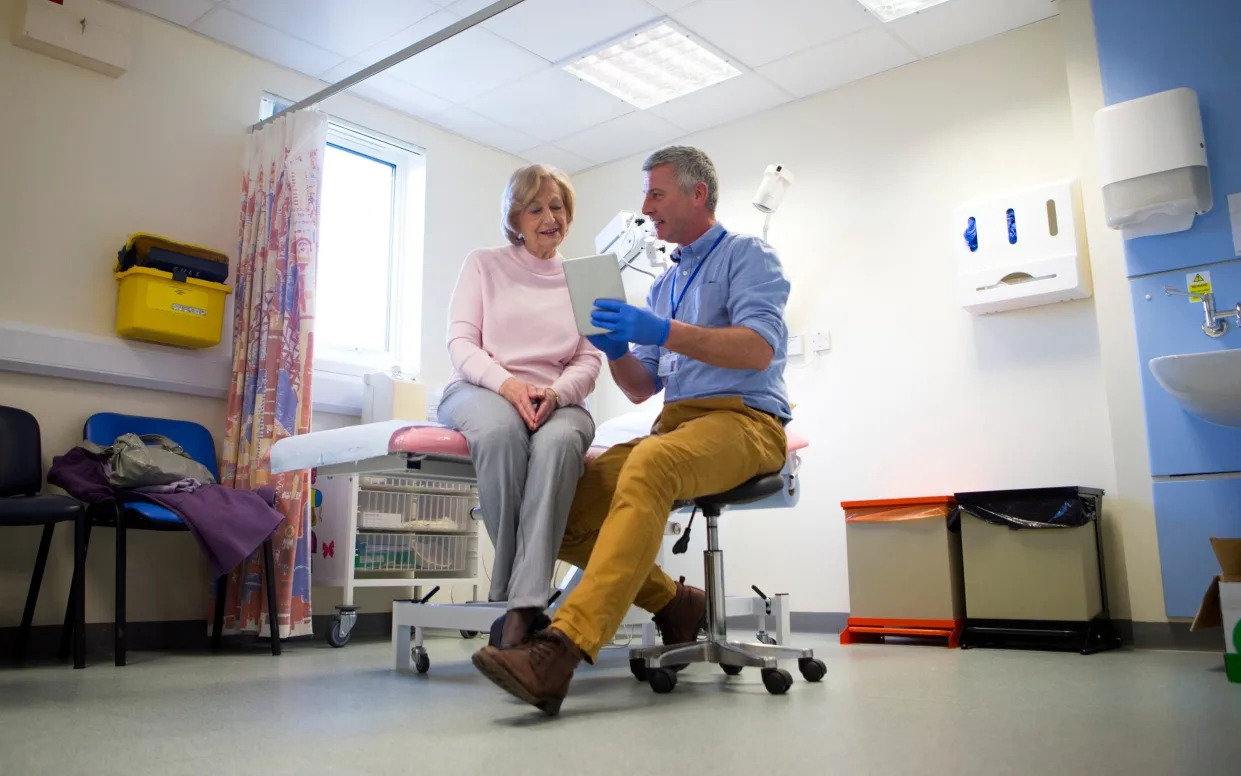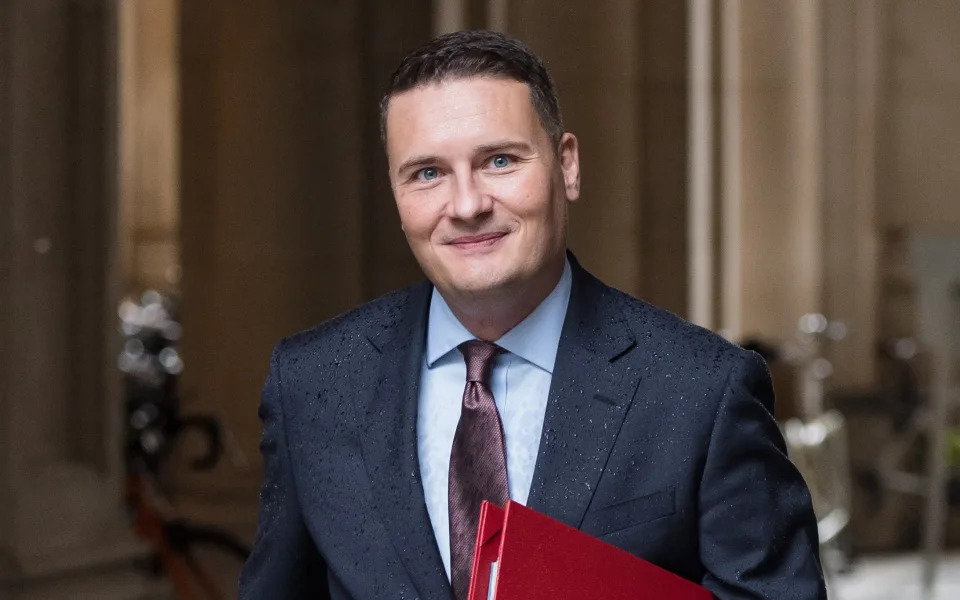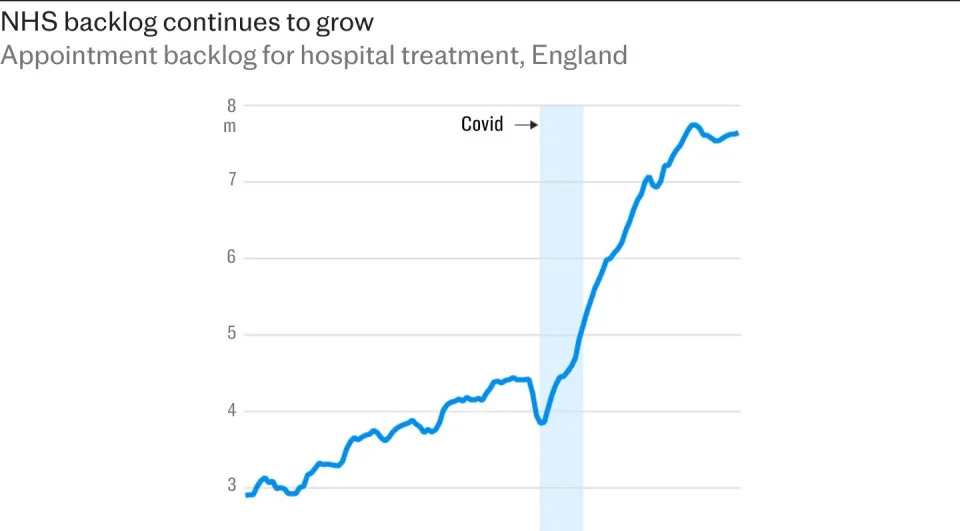Private hospitals to rescue NHS
Laura Donnelly
Thu 10 October 2024

A doctor speaks to a female patient
The NHS will rely on private hospitals to ease a growing crisis under plans being considered by the Government.
The £1 billion rescue plan to clear waiting list backlogs would result in the independent sector funding the biggest expansion in healthcare since Sir Tony Blair’s premiership.
Cancer checks, surgery and intensive care for NHS patients would increasingly take place in private hospitals, under proposals submitted to the Treasury ahead of the Budget.
A source said the Government would “grab with both hands” any spare capacity to get NHS patients treated more quickly.
The NHS has been pleading for extra funds ahead of the Budget on Oct 30, but in his first speech as Health Secretary, Wes Streeting vowed to end “the begging bowl culture, where the only interaction the Treasury has with the Department of Health is ‘we need more money for X, Y and Z’”.
Under the plans, submitted by private hospitals, the independent sector could treat up to 2.5 million more patients, with some treatment starting in weeks.

Wes Streeting vowed to end a “begging bowl” relationship between the Department of Health and the Treasury - Wiktor Szymanowicz/Future Publishing
The private sector investment would be used to build a string of diagnostic centres for NHS patients across the country, tackling delays in cancer diagnosis, and to develop new surgery units and intensive care facilities.
It comes as NHS waiting lists in England stand at 7.64 million, with warnings that the health service is “hurtling into crisis” as winter approaches. When Labour won the election, Mr Streeting pronounced the NHS “broken”. Since then, waiting lists have risen, with little progress made on pledges to carry out an extra 40,000 appointments.
The Independent Healthcare Providers Network (IHPN), which represents private hospitals, including groups such as Bupa, Circle Health Group and Care UK, has written to the Chancellor and the Health Secretary saying that more than £1 billion of private sector capacity could be invested into facilities for NHS patients.
Mr Streeting is understood to be very interested in the proposals, which would see the private sector committing to a major expansion, using its own staff and both existing and new facilities.
Ahead of the election Mr Streeting said a new Government would “go further than New Labour ever did” in use of the private sector for NHS patients.
“If you want to understand my appetite for reform, think New Labour on steroids,” he said in a speech in May.
The scale of the expansion being considered would surpass moves made by the Blair government, which first introduced use of the private sector by the NHS.

Under Sir Tony and Gordon Brown, the Labour government funded a network of 30 private clinics carrying out operations and tests for NHS patients between 2003 and 2010.
It also introduced patient choice, allowing patients to opt for care in a private hospital, but the drive divided the party and lost momentum.
The new plans, now under discussion with the independent sector, would vastly extend this, with private companies having the chance to win a greater share of the market.
It follows an independent investigation of the NHS by Lord Darzi, which last month warned that the health service was “starved” of capital, which was badly affecting its productivity with too little diagnostic equipment and too few beds and facilities.
Under the plans, investment in the expansion of the health service would come from private facilities.
Around 1 million appointments for NHS patients at private units would be released over the next year from existing capacity, starting within weeks.
In addition, around 1.5 million more operations and appointments would be offered from new and expanded facilities which could start to be deployed within months.
2.5 million extra patients treated privately
This would mean around 7.5 million NHS patients a year treated in private hospitals, up from around 5 million now.
In the letter to Rachel Reeves and Mr Streeting, David Hare, chief executive of the IHPN, said that its investment would mean new facilities could be deployed within months and staffed without drawing staff from the existing NHS workforce.
The network said providers would recruit from abroad and hire staff who have left the NHS, as well as training some staff through apprenticeships.
Previous attempts to use independent hospitals have been limited to some of the simpler procedures, such for cataracts, and hip and knee operations.
However, the new plans would mean independent hospitals would expand their capacity, with some building intensive care units, in order to take on a wider range of cases.
At present, one in seven private hospitals have such facilities, limiting their ability to safely take on complex cases.
The proposals would also lead to a new wave of community diagnostic centres, carrying out tests for diseases such as cancer, which would only treat NHS patients, but be run by the private sector.
‘We want to grab it with both hands’
The plans aim to ease short-term problems facing the health service, with capacity that can be built within the next year.
The IHPN said that “well over £1 billion of private sector capital” could be invested in care for NHS patients, if a long-term deal was agreed.
A Government source said: “If there is any potential extra capacity to help us cut waiting lists faster and get more NHS patients treated, we would want to grab it with both hands.”
Mr Hare told The Telegraph: “When Labour was last in government one of the ways in which it got NHS waiting times down was to make good use of available private sector capacity paid at NHS prices and by asking the private sector to deploy capital on new services including surgical and diagnostic care.
“With NHS waiting lists now at record highs and the public finances stretched, the forthcoming Budget represents a real opportunity to make good on the government’s pre-election commitments of working in partnership with the private sector over the long-term to use the capital, capacity and capability which is there in the sector to improve services for NHS patients.”
A Department of Health and Social Care spokesman said: “This government is steadfast in its commitment to the founding principles of the NHS, which will always be free at the point of use.
“Where there is spare capacity in the private sector which can be used to treat patients, on NHS terms, free at the point of use, we will use it to cut waiting lists.”
No comments:
Post a Comment